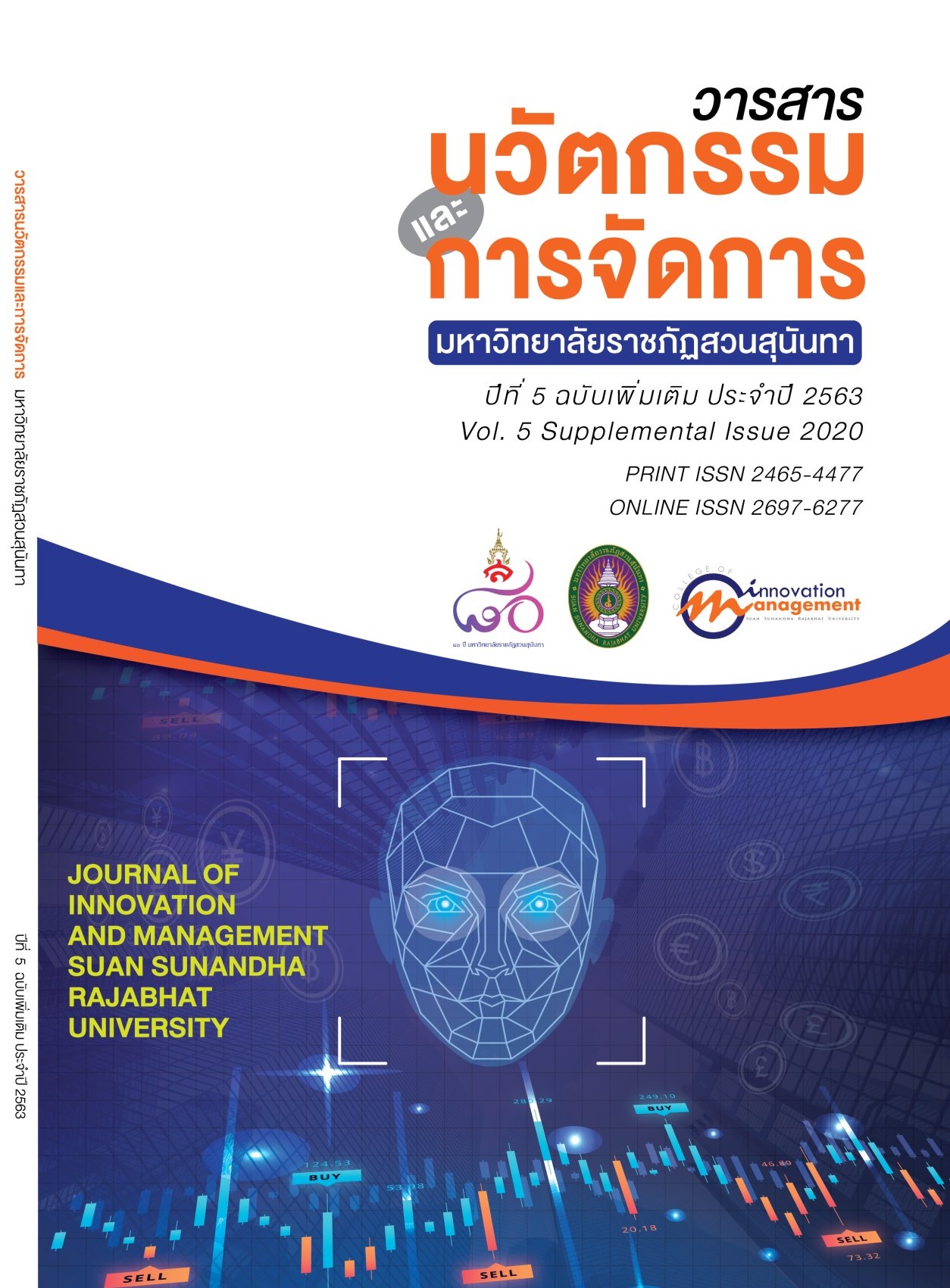The Influence of Transformation Leadership and Ability to Reduce Waste and Intervening Variables of Empowerment are Impact to The Performance of Logistic Department Staff in Asian Alliance International Company Limited
Keywords:
Transformation leadership, Ability to waste reduction, EmpowermentAbstract
The objectives of this research were (1) to study the influence of the transformation leadership with ability to waste reduction, (2) to study the influence of social empowerment between transformation leadership with ability to waste reduction, (3) to study the influence of psychological empowerment between transformation leadership with ability to waste reduction, and (4) to study the influence of ability to waste reduction with performance efficiency of employees in Logistic Department, Asian Alliance International Co., Ltd. The sample group consisted of 892 employees using stratified random sampling by divisions. This research was a quantitative research. Regression analysis was applied for data analysis to find out influencing variables. The findings revealed that transformation leadership have positive influence on ability to waste reduction. Moreover, ability to waste reduction also have positive influence on performance efficiency of the employees. In addition, the study of 2 moderator variables, social empowerment and psychological empowerment, indicated that both are moderator variables and have negative influence on ability to waste reduction. From the research, the organization should support the development of transformation leadership because it will benefit the organization. To reduce the loss to the organization and will lead to an increase in efficiency in the organization
References
Boonyarit, I., Chomphupart, S. and Arin, N. (2010). Leadership, Empowerment, and Attitude Outcomes, The Journal of Behavioral Science, 5(1), 1-14.
Burawat, P. (2017). The Relationships Among Transformational Leadership, Sustainable Leadership, Lean Manufacturing Practices, and Sustainability Performance in Thai Manufacturing Industry. Pathum Thani: Rajamangala University of Technology Thanyaburi. (in Thai)
Choemchuen, I. (2013). Factors Related to the Social Empowerment of People in Bangkok.
Metropolitan Administration. Thesis of the Degree of Master of Art in Social Development Administration. Bangkok: National Institute of Development Administration. (in Thai)
Inchean, P., Sutapong. and K. Leeben, Y. (2017). Strategic for building and developing the next generation of corporate leader. Modern Management Journal, 15(1), 45-54. (in Thai)
Jansiri, N. (2017). Leadership in Change Management to Create Innovation in Organization. Walailak Abode of Culture Journal, 17, 79-98. (in Thai)
Jituea, N. and Jadesadalug, V. (2019). Promoting the Creative Work Behavior to Innovation Effectiveness and Organizational Performance, MUT Journal of Business Administration, 16(1), 200-229. (in Thai)
Khuakoonrat, K. (2011). Transformational Leadership Administrators Affecting the Effectiveness of Medium-sized School in Amphoe Photharam Under the office of Ratchaburi Primary Education Service Area 2. Thesis of the Degree of Master of Educaiton in Educational Administration Technology. Pathum Thani: Rajamangala University of Technology Thanyaburi. (in Thai)
Lappanopakorn, K., Jadesadalog, V. and Sansook, J. (2017). Developing Model of Risk Management Capabilities Toward Organizational Performance of Higher Education Institutions in Thailand. Dusit Thani College Journal, 11(3), 185-201. (in Thai)
Likert, R. (1967). The Method of Constructing and Attitude Scale. In Reading in Fishbein, M (Ed.) Attitude Theory and Measurement. New York: Wiley and Son, pp. 90-95.
Monattarapadung, S. and Jadesadalog, V. (2017). The Influence of Empowerment in Affecting Organizational Citizenship Behavior: The Mediating Effect of Organizational Commitment of the Officials of the Secretariat of the Senate. Journal of Faculty of Applied Arts, 10(2), 24-35. (in Thai)
Namrassi, P., Saisanguan, R., Theptabtim, A. and Aungkulanon, P. (2019). Waste Reduction in Production System for Cleanroom Apparels. Academic Journal Phranakhon Rajabhat University, 2(2), 25-34. (in Thai)
Napakanaporn, S. (2011). Entrepreneur’s Management Process, Leadership and Skill Affecting the Success on Tourism Business in Thailand. Thesis of the Degree of Master of Business Administration in Management. Bangkok: Srinakharinwirot University. (in Thai)
Phoruksa, P. and Smutharanond, T. (2018). Trust in Supervisor, Work Engagement, Organizational Citizenship Behavior and Job Performance of Professional Nurses in the Private Hospital. Journal of Social Sciences and Humanities, 44(2), 249-273. (in Thai)
Phonpratum, L. (2019). Model of Administrators Trransformational Leadership to Effectiveness of Secondary School Administration Under the office of Secondary Education Commission in Eastern Region. Journal of Sahasat, 19(1), 83-110. (in Thai)
Pimonratnakan, S. and Jadesadalog, V. (2017). The Influence of The Perception Organizational Climate through Job Satisfaction and Organization Commitment In-Role Performance. Veridian E-Journal, Silpakorn University, 10(2), 1611-1629. (in Thai)
Pinthurak, U. (2010). The Relationship Between Transformational Leadership of School Administrators and The Effectiveness of Personal Management in Primary Schools under the Office of Udonthani Educational Service Area. Thesis of the Degree of Master of Education. Udon Thani: UdonThani Rajabhat University. (in Thai)
Pinyakhun, P., Cheevakasemsook, A. and Sanprasarn P. (2017). The Development of a Diabetic Clinic Service Model by Applying Lean Concept at Chaoprayayomraj Regional, Suphan Buri Province. Journal of the Royal Thai Army Nurses, 18 (Supplement), 280-290. (in Thai)
Siwapitak, S. (2013). The Effect of Transformation Leadership on Learning Organization in Tourism Business Corporation. BU Academic review, 12(2), 58-71. (in Thai)
Srimunta, P. (2018). Reduction Waste from the waiting in the supply chain of laboratory diagnostic procedures in clinical chemistry. Kasetsart Applied Business Journal, 13(18), 1-14. (in Thai)
Surasischanon, T. (2018). The Empowerment Factors for Teacher in Basic Education School. Thesis of the Degree of Doctor of Philosophy Program in Educational Administration. Bangkok: Silpakorn University. (in Thai)
Thavorn, D. (2019). The Concept Classification of Losses and Small Group Activities in Monozukuri. Veridian E-Journal, Silpakorn University, 11(3), 635-654. (in Thai)
Wantanang, D. (2017). Employee Empowerment:Visionary Leaders’administration Tactics. Modern Management Journal, 15(1), 35-44. (in Thai)
Downloads
Published
How to Cite
Issue
Section
License
Copyright (c) 2020 Journal of Innovation and Management

This work is licensed under a Creative Commons Attribution-NonCommercial-NoDerivatives 4.0 International License.
See Publication Ethics https://so03.tci-thaijo.org/index.php/journalcim/Ethics






